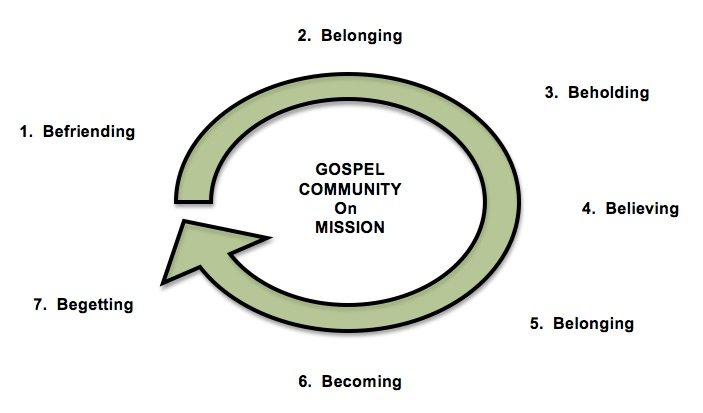Several years ago, I hashed out in a moleskine a process to making the gospel visible in word and deed in the neighborhood. I used the prefix “be” to harmonize 7 steps that are sequential and cyclical. This is a significant element to my understanding and approach to living out my faith in the neighborhood. Here they are with brief explanations:
7 Steps to Incarnational Mission in the Hood
- Be-friending – gospel-driven believers neighbor well in their community and build intentional relationships with unbelievers with a “sent” focus to love them meaningfully and build relational equity.
- Be-longing – these believers cultivate relationships by dwelling (incarnationally) with their new unbelieving friends and invite them to be a part their lives and especially their small (group) community as they encounter a network of authentic relationships with other Christians.
- Be-holding – as unbelievers embrace the hospitality Christians have shown them, they witness firsthand and behold what the Christian life looks like (embracing the gospel). They see and experience up close both in word and deed lives transformed by the gospel. They are given a generous welcome to see the beauty of Jesus in the lives of His followers.
- Be-lieving – unbelievers understand what responding to the gospel means, namely repentance of sin and faith in Jesus Christ because they have seen it lived out among Christians, and through this, they believe in the good news of Jesus Christ and embrace Him as Savior and King.
- Be-longing – new believers learn what it means to identify (through baptism), belong (covenant membership), live (mission) as a family of servants with God as our Father.
- Be-coming – new believers grow through continual rediscovery of the gospel in all its implications and application, being conformed to Christ through a community aggressively pursuing holiness.
- Be-getting – growing Christians reproduce themselves by making disciples in a community of disciple-making disciples and thereby repeat the cycle of incarnational mission in the hood.
So the process of being on mission in a hood takes an unbeliever from first engaged with gospel intentionality and ends with gospel reproduction (the process then repeats). The process can be broken down in pairs as well:
- Mission and Community » Befriending and Belonging
- Mission and Gospel » Beholding and Believing
- Mission and Discipleship » Belonging and Becoming
- Mission and Leadership » Begetting
There has been some debate in evangelical circles as to whether it is appropriate for non-Christians to belong before believing. My position on this is non-Christians can and should belong to Christians prior to believing for the following reasons:
- Christians should have meaningful relationships with non-Christians. While they are not believers yet, life can be shared and non-Christians can experience the love of Christ through their Christian friends.
- Non-Christians need to see and understand the gospel clearly. There is so much confusion out there as to what the gospel is and how to biblically respond to it. As non-Christians belong in a missional community in the hood, they get to see and learn firsthand and up close as well as ask questions so that they can get a truer and clearer picture of what it means to know and follow Jesus.
- Non-Christians and Christians need to hear, believe, and respond to the same message. The gospel is for Christians and non-Christians alike. There isn’t a different message for these two categories of people. As non-Christians belong to Christians, they see what it looks like to repent and believe as that should be normative and celebrated in the lives of Christians who enjoy grace and live in the goodness of the gospel.
I am not saying that non-Christians who belong before believing are belonging to a church in the form of a covenant membership or somehow given place of leadership or volunteering to serve on ministry teams. I am saying that their belonging gives them access, exposure, and meaningful connection to Christian community where there questions can be answered, their struggles can be embraced, and their lives can be changed as they come to see, understand, and respond to the gospel of Jesus Christ.
